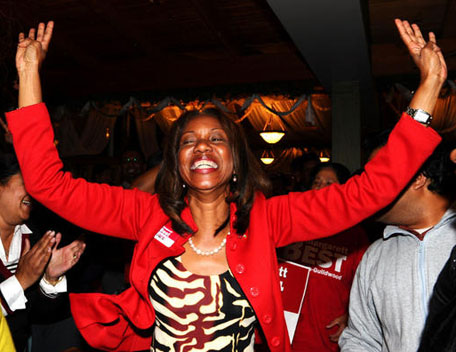The bittersweet Ontario election of 2011
Oct 7th, 2011 | By Randall White | Category: In Brief
Liberal candidate Margarett Best celebrates her victory in the Toronto riding of Scarborough-Guildwood. RICK EGLINTON/TORONTO STAR.
On TV last night someone (Robin Sears?) called the Ontario provincial election of 2011 bittersweet for all contenders, and that seems a good summary to me.
There is a chance of last-minute ups and downs as I write just short of 1 AM on the morning of October 7, but apparently not too much. As matters stand, the McGuinty Liberals have won 53 seats – just one seat short of a bare majority in the Legislative Assembly – with 37.6% of the province-wide vote.
The Hudak Conservatives managed a close second-place finish with 35.4% of the province-wide vote. But this brought only 37 seats. (In fact, 37 seats amounts to 34.6% of the total 107 seats available – only slightly less than the Conservative percentage of the province-wide vote. So the ultimate political-junkie point is not so much that the Conservatives’ especially geographically “inefficient” vote brought them less seats than they deserved, but that the Liberals’ especially efficient vote brought them more!)
Somewhat more unfairly (as proponents of electoral reform see things at any rate), the New Democrats won only 17 seats (15.9% of the total 107 seats available) with 22.8% of the province-wide vote. The Greens won 2.9% but no seats. (And others took 1.3% of the vote but won no seats: there are currently 21 registered political parties in the province.)
The bittersweet taste for Andrea Horwath’s New Democrats is that in 2011 they have substantially improved on their 10 seats with 16.8% of the province-wide vote in 2007. But they have not done at all as well as their federal counterparts this past May 2 (to no small extent, no doubt, because while Quebec is happily still part of Canada, it is not part of Ontario – and neither is Manitoba or Nova Scotia!).
Tim Hudak’s Conservatives have similarly taken only 2.2% less of the province-wide vote than the Liberals – and stopped their chief rivals just short of a majority government. This is an impressive enough performance for a new and still quite young leader. But it is a bitter disappointment when viewed from the 10-point lead the party apparently enjoyed in the polls as recently as the middle of this summer. (Or for those who really do somehow think that “conservative values” are about to take over all of Canada, coast to coast to coast, etc, etc.)
For their part the McGuinty Liberals have overcome the Hudak Conservatives’ earlier 10-point lead in the polls. Premier Dad himself has become “the province’s first three-term Liberal premier in more than a century” – and the first three-term premier of any Ontario provincial party since Bill Davis in 1977. But the Liberals’ 53 seats in 2011 are a big comedown from their 71 seats (with more than 42% of the province-wide vote) in 2007. Premier McGuinty does seem to have believed he would win at least a smaller majority government this time. But he has fallen at least one seat short of the barest version of his goal. I agree myself with the view that he will be trying to run his new “strong minority” government as the Bill Davis he admires so much did in the last half of the 1970s. This could involve leaning on support from the Hudak Conservatives almost as often as the Horwath New Democrats. And I am sceptical about Ms. Horwath’s alleged new strategic position under a McGuinty minority government. (Even though I would personally rather see a revival of the 1985 Liberal-NDP Accord, than a revival of the Davis minority model of 1975—1981!) Yet, however you look at things, as a result of yesterday’s election Ontario has been, as the Canadian Press aptly enough puts it, “plunged into uncertain political waters.” And that can only complicate the way ahead for Premier Dad.
Finally, the Ontario election of October 6, 2011 has been a bittersweet affair for we mere voting people of Ontario too. For those of us who do seriously qualify as political junkies it did turn into a real cliff hanger, right up until midnight and a bit beyond. It has proved considerably more interesting, and even fascinating, than many imagined, at the start of the summer say. And yet, according to early reports from the Canadian Press, “just 47.6 per cent of eligible voters turned out, down from the already unprecedented 52.1 per cent who voted in 2007.” This is, without any shred of a doubt, an enormous blight on the real world of democracy in Canada’s most populous province. And all of us who claim to be concerned about or even just interested in such things really ought to start worrying about just what it really means!

